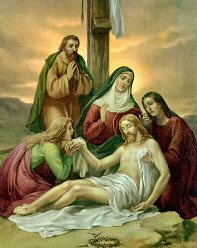From CatholicCulture.org:

Daily Readings for:March 12, 2012
Move to: Previous Day | Next Day

The most comprehensive treatment of the Liturgical Year available online: daily reflections, saints, seasons, calendars, prayers, activities, and recipes.

Daily Readings for:March 12, 2012
(Readings on USCCB website)
Collect: May your unfailing compassion, O Lord, cleanse and protect your Church, and since without you she cannot stand secure, may she be always governed by your grace. Through our Lord Jesus Christ, your Son, who lives and reigns with you in the unity of the Holy Spirit, one God, for ever and ever.
- Good Example — A Lesson in Discipline
- Open, O Hard and Sinful Heart!
- Religion in the Home for Elementary School: March
- Religion in the Home for Preschool: March
- Prayer for the Third Week of Lent
- Novena to St. Joseph
- Lent Table Blessing 3
- Novena to St. Joseph II
- Traditional Novena Prayer to St. Joseph
- None
RECIPES
ACTIVITIES
PRAYERS
LIBRARY
Lent: March 12th

 Monday of the Third Week of LentOld Calendar: St. Gregory the Great, pope and doctor
Monday of the Third Week of LentOld Calendar: St. Gregory the Great, pope and doctor
Move to: Previous Day | Next DayAccording to the 1962 Missal of Bl. John XXIII the Extraordinary Form of the Roman Rite, today is the feast of Pope St. Gregory the Great. His feast in the Ordinary Form of the Roman Rite is celebrated on September 3.
Thanks to Fear of the Lord, There is no Fear of Evil
History, in fact, is not alone in the hands of dark powers, chance or human choices. Over the unleashing of evil energies, the vehement irruption of Satan, and the emergence of so many scourges and evils, the Lord rises, supreme arbiter of historical events. He leads history wisely towards the dawn of the new heavens and the new earth, sung in the final part of the book under the image of the new Jerusalem (cf. Revelation 21-22).
History, in fact, is not alone in the hands of dark powers, chance or human choices. Over the unleashing of evil energies, the vehement irruption of Satan, and the emergence of so many scourges and evils, the Lord rises, supreme arbiter of historical events. He leads history wisely towards the dawn of the new heavens and the new earth, sung in the final part of the book under the image of the new Jerusalem (cf. Revelation 21-22).
It must be reaffirmed, therefore, that God is not indifferent to human events, but penetrates them realizing his "ways," namely his plans and his efficacious "deeds."
According to our hymn, this divine intervention has a very specific purpose: to be a sign that invites all the peoples of the earth to conversion. Nations must learn to "read" in history a message of God. Humanity's history is not confused and without meaning, nor is it given over, without appeal, to the malfeasance of the arrogant and perverse. There is the possibility to recognize divine action hidden in it. In the pastoral constitution "Gaudium et Spes," Vatican Council II also invites the believer to scrutinize, in the light of the Gospel, the signs of the times to see in them the manifestation of the very action of God (cf. n. 4 and 11). This attitude of faith leads man to recognize the power of God operating in history, and thus to open himself to fear of the name of the Lord. In biblical language, in fact, this "fear" does not coincide with dread, but is the recognition of the mystery of the divine transcendence. Because of this, it is the basis of faith and is joined with love: "the Lord your God requires of you, but to fear the Lord your God, to walk in all his ways, to love him, to serve the Lord your God with all your heart and with all your soul" (cf. Deuteronomy 10:12).
Following this line, in our brief hymn, taken from Revelation, fear and glorification of God are united: "Who will not fear you, Lord, or glorify your name" (15:4)? Thanks to fear of the Lord there is no fear of the evil that rages in history and one takes up again with vigor the journey of life, as the prophet Isaiah declared: "Strengthen the hands that are feeble, make firm the knees that are weak, say to those whose hearts are frightened: Be strong, fear not!'" (Isaiah 35: 3-4).
Excerpted from Thanks to Fear of the Lord, There Is No Fear of Evil, Pope Benedict XVI, May 11, 2005
Things to Do:
- Your children may want to spend their Saturday afternoon learning about different local charitable organizations or needy families to whom the alms from the family'sLenten Jar will be given.

The Station is in the church of St. Mark, which was built in the fourth century in honor of the evangelist, by the holy Pope Mark, whose relics are kept there.
No comments:
Post a Comment